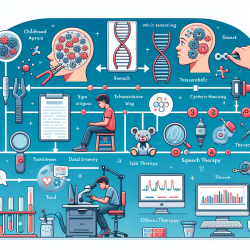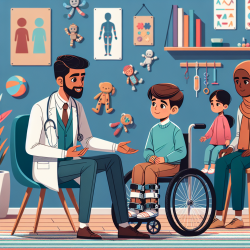Introduction
In the ever-evolving field of speech-language pathology, understanding the genetic underpinnings of disorders like Childhood Apraxia of Speech (CAS) can revolutionize therapeutic approaches. The research article "Whole-exome sequencing supports genetic heterogeneity in childhood apraxia of speech" offers groundbreaking insights into the genetic diversity of CAS, highlighting the potential for personalized treatment strategies.
The Genetic Landscape of CAS
CAS is a complex pediatric motor speech disorder characterized by difficulties in planning and coordinating the movements necessary for speech. The study utilized whole-exome sequencing (WES) to explore genetic variants in children diagnosed with CAS. The findings revealed clinically significant variants in several genes, suggesting a heterogeneous genetic basis for the disorder.
Key Findings
- Genetic variants were identified on five chromosomes, involving six genes strongly associated with CAS or overlapping phenotypes.
- 80% of the participants had reportable variants in one or two of these genes, with ATP13A4, KIAA0319, and CNTNAP2 being the most prevalent.
- The study supports the notion that CAS has multiple genetic origins, which can influence the clinical presentation and severity of the disorder.
Implications for Practitioners
Understanding the genetic diversity in CAS can empower practitioners to tailor interventions more effectively. By recognizing the genetic factors at play, speech-language pathologists can:
- Develop personalized therapy plans that address the specific genetic profile of each child.
- Utilize genetic information to predict therapy outcomes and adjust strategies accordingly.
- Collaborate with geneticists to explore potential gene-targeted therapies.
Encouraging Further Research
The study opens avenues for further research into the genetic mechanisms underlying CAS. Practitioners are encouraged to stay informed about the latest genetic research and consider participating in collaborative studies that aim to refine diagnostic criteria and treatment modalities.
Conclusion
The insights gained from this research underscore the importance of integrating genetic data into the clinical management of CAS. By embracing a data-driven approach, practitioners can enhance the efficacy of their interventions, ultimately leading to better outcomes for children with CAS.
To read the original research paper, please follow this link: Whole-exome sequencing supports genetic heterogeneity in childhood apraxia of speech.










